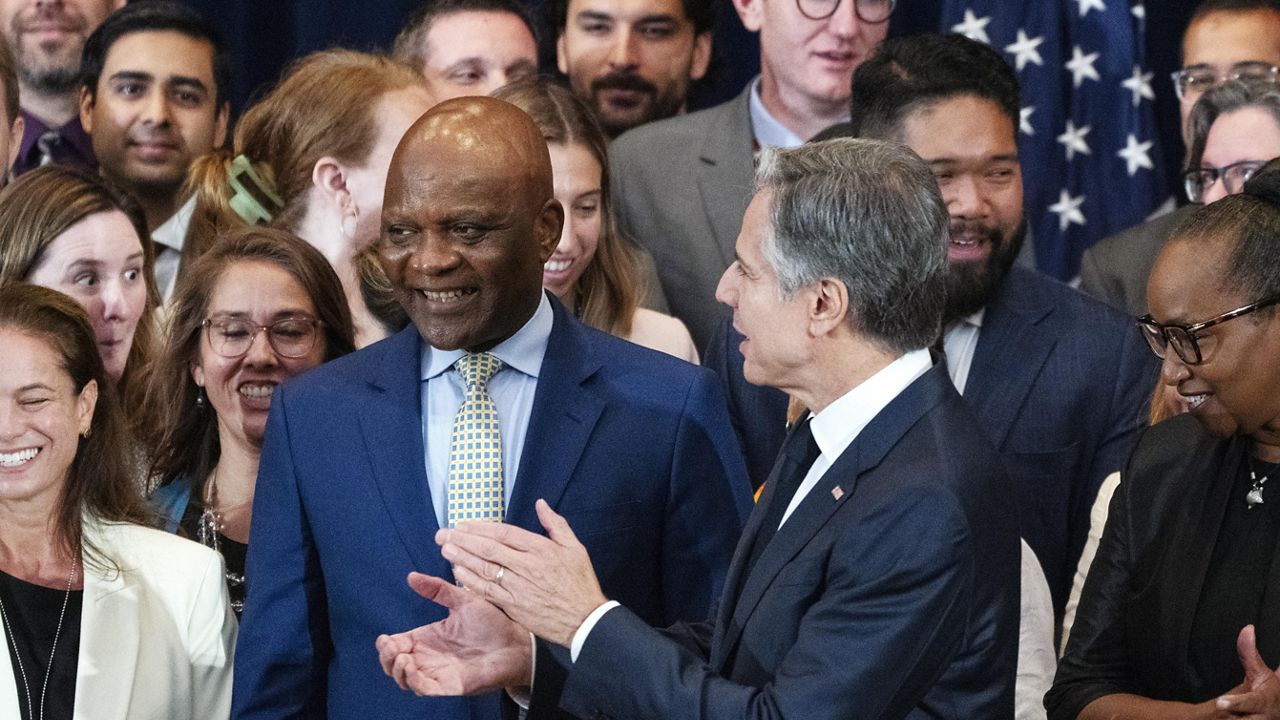Aiming to put lessons learned during the COVID-19 pandemic into action, the Biden administration on Tuesday launched the Bureau for Global Health Security and Diplomacy.
What You Need To Know
- Aiming to put lessons learned during the COVID-19 pandemic into action, the Biden administration on Tuesday launched the Bureau for Global Health Security and Diplomacy
- A division of the State Department, the new bureau aims to save lives at home and abroad by being better prepared for future health crises and coordinating greater international collaboration
- The bureau, which comprises nine federal offices, will lead the U.S. Agency for International Development’s efforts on three top health priorities: prevent child and maternal deaths, controlling the HIV/AIDS epidemic, and combating infectious diseases
- John Nkengasong, ambassador-at-large for global health diplomacy, was chosen to be the bureau’s first leader
A division of the State Department, the new bureau aims to save lives at home and abroad by being better prepared for future health crises and coordinating greater international collaboration.
“In the last few years, it made evident that a pandemic is not only a health crisis, it's a security crisis, it’s an economic crisis, it's a humanitarian crisis,” Secretary of State Antony Blinken said during a launch event Tuesday in Washington. “We have an imperative to do everything that we can to prevent another pandemic.”
The bureau will centralize the efforts of the Office of International Health and Biodefense, the coordinator for global COVID-19 response and health security, and the office that leads the U.S. President’s Emergency Plan for AIDS Relief (PEPFAR) and houses the Office of Global Health Diplomacy. The State Department will carry out the work as coordinated by the National Security Council and in collaboration with other U.S. departments and agencies, including the United States Agency for International Development, said a USAID spokesperson.
Blinken said the bureau will seek to leverage the United States’ diplomatic ties to bring nations together in addressing health challenges.
“We're setting up a new bureau to focus fully on the need to drive both internal and international coordination and accelerate the State Department's ongoing efforts to strengthen global health security so that the world can respond with immediacy and intention when the next health crisis emerges,” he said.
Blinken announced the creation of the bureau in December, noting Tuesday it came together at “warp speed” by Washington standards.
The agency will have three main functions, he said:
Strengthening global health security architecture — including potentially modernizing the World Health Organization and shaping the world pandemic fund — so the world will be better prepared for and prevent infectious diseases.
Using U.S. foreign assistance to strengthen public health systems, including labs and supply chains.
Elevating health security as a core U.S. foreign policy in diplomatic engagements as well as in domestic policymaking.
“What a difference a pandemic makes to get people across the globe to recognize that no one is safe until everyone is, to recognize that you can be rich but you can still die of some little bug you can never see,” said Health and Human Services Secretary Xavier Becerra. “What a difference a pandemic makes to make us realize that we have to do this together globally.”
John Nkengasong, ambassador-at-large for global health diplomacy, was chosen to be the bureau’s first leader. A virologist, he is also the White House’s global AIDS coordinator.
“Launching this bureau comes at a critical point because … we recognize that the frequency of the health threats increase because of the greater connectivity, globalization, climate change, population growth, food insecurity and many others,” he said.
Nkengasong also announced a new $40 initiative, through PEPFAR, toward eliminating mother-to-child transmission in high HIV-burden countries.
He said HIV/AIDS “remains a persistent threat, both at home and abroad.”
Correction: A previous version of this article incorrectly stated USAID's role in the new bureau.



